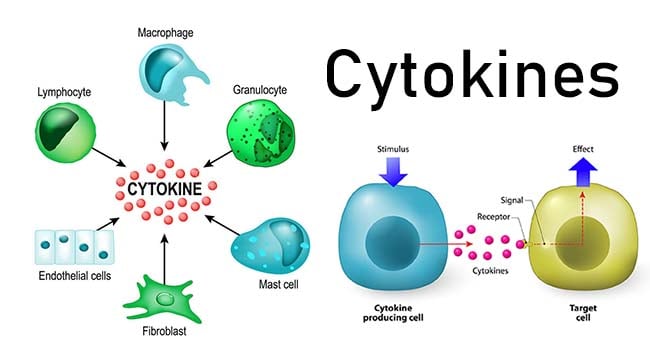Interesting Science Videos
Cytokines
- Cytokines are a family of small proteins that mediate an organism’s response to injury or infection.

- Cytokines operate by transmitting signals between cells in an organism.
- Minute quantities of cytokines are secreted, each by a single cell type, and regulatory functions in other cells by binding with specific receptors.
- Their interactions with the receptors produce secondary signals that inhibit or enhance the action of certain genes within the cell.
- Unlike endocrine hormones, which can act throughout the body, most cytokines act locally, near the cells that produced them.
- Antigen presenting cells and T-cell activation result in rapid intracellular biochemical cascades that induces transcription of many genes including cytokines and their receptors.
- Cytokines are low molecular weight regulatory proteins or glycoproteins secreted by white blood cells and various other cells in the body in response to a number of stimuli.
- Cytokines are usually secreted by cells of the immune system.
- Some cytokines [e.g. type I interferons and tumor necrosis factor (TNF)] are secreted by non-immune cells (e.g. epithelial cells).
- These proteins assist in regulating the development of immune effector cells, and some cytokines posses direct effector functions of their own.
- It includes:
- Monokines: Cytokines produced by mononuclear phagocytic cells.
- Lymphokines: Cytokines produced by activated lymphocytes, especially Th cells.
- Interleukins: Cytokines that act as mediators between leukocytes.
- Chemokines: Cytokines primarily responsible for leucocyte migration.
Mechanism of Action of Cytokines
- Cytokines bind to the specific receptors on the membrane of target cells, triggering signal transduction pathways that ultimately alter gene expression in the target cells.
- Particular cytokines:
- May bind to receptors on the membrane of the same cell that secreted it, exerting autocrine action.
- May bind to receptors on a target cell in close proximity to the producer cell, exerting paracrine action.
- May bind to target cells in distant parts of the body exerting endocrine action.
Function of Cytokines
- On the basis of functions, they can have three biological actions:
- Mediators and regulators of innate immunity: are produced mainly by mono-nuclear phagocytes in response to infectious agents.
- Mediators and regulatory of adaptive immunity: are produced mainly by T lymphocytes in response to specific recognition of foreign antigens.
- Stimulators of hematopoiesis: are produced by bone marrow stromal cells, leukocytes, and other cells, and stimulate the growth and differentiation of immature leukocytes.

Thanks for the presentation,it’s been helpful,and has eased my reading!
This was a good presentation and thank you for simplicity you helped me so much
Muito bom é fácil de entender